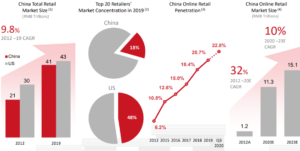3 Chinese E-Commerce Stocks to Buy With Your Ang Baos

With Chinese New Year on the way, many of us in Asia will be receiving customary red packets (or “Ang Baos”) filled with money.
With many places in lockdown, and as travel worldwide has pretty much stopped, what should we be spending our money on?
One idea is to look at putting our money to work in long-term investment ideas. These include stocks that are benefitting from the huge rise of e-commerce in China.
When we think of e-commerce and China, we automatically think of giant Alibaba Group Holding Ltd (NYSE: BABA) (SEHK: 9988) but there are in fact many others as well.
Here are three China-focused e-commerce stocks that investors can spend their ang baos on this Chinese New Year.
1. JD.com
The words “e-commerce” and “China” wouldn’t be complete if I didn’t mention JD.com Inc (NASDAQ: JD) (SEHK: 9618).
Typically seen as the main rival to Alibaba in the e-commerce space, JD has taken a different approach to serving customers from its larger rival.
While Alibaba is more of a marketplace operator – including Taobao and Tmall – that doesn’t take on inventory or fulfill orders, JD.com is a “first-party” operator.
That means it takes on inventory and fulfills orders on its platform via its logistics network. This gives it more control over its products and delivery times.
It has experimented with drone deliveries and autonomous vehicles when figuring out how best to streamline the process.
JD saw its third-quarter 2020 net revenues rise 29% year-on-year to RMB 174.2 billion (US$27 billion) while it also continues to improve its operating margin. This reached 15.4% in its latest quarter, up from 14.9% in the third quarter of 2019.
JD, and indeed other China e-commerce players, are seeing strong structural tailwinds from e-commerce in China (see below).

Source: JD.com Q3 2020 earnings presentation
JD shares have more than doubled over the last year. With a market capitalisation of US$152 billion (around one-fifth of Alibaba’s), JD has plenty more room for growth ahead.
2. Pinduoduo
The second e-commerce stock is a relatively newer entrant into the Chinese market; Pinduoduo Inc (NASDAQ: PDD).
Also known as PDD, the company has been a huge success in promoting its “social” form of online shopping.
Basically a social version of group buying, users on PDD’s platform can form teams of buyers to get lower prices on goods.
It’s been an astounding success and the company went public on the US stock market in July 2018. Having floated at US$19 per American Depository Receipt (ADR), PDD shares are up 10-fold since then.
PDD has flourished by focusing on third-tier and fourth-tier cities where more price-conscious consumers hold sway.
Its latest earnings were a testament to this success. Monthly average users (MAUs) were up a whopping 50% year-on-year to 643 million.
Meanwhile, in the third quarter of 2020 gross merchandise value (GMV) on its platform over the trailing 12 months was up 73% year-on-year to RMB 1.45 trillion.
With the runway for growth still huge for PDD, this social shopping giant can still reward investors over the long term.
3. Meituan Dianping
Finally, we have Meituan Dianping (SEHK: 3690), an online food delivery and travel services firm. It had its origins in operating a food delivery platform but has slowly grown its platform to offer many more services.
One of the key growth drivers in recent years has been its hotel-booking service that it integrated into its platform.
Obviously, revenue from this took a dive following the lockdowns in February 2020 but has also rebounded as domestic travel in China resumed later in the year.
In its latest earnings release, Meituan saw a 28.8% year-on-year rise in revenue to RMB 35.4 billion while its operating profit ballooned by 364% year-on-year to RMB 6.7 billion.
However, one of the most exciting areas of future growth for Meituan lies in its entry into the massive grocery market in China.
With online grocery delivery only a small share of the overall grocery market in China, the room for growth for Meituan remains sizeable.
By leveraging its extensive food delivery network, the company has been able to significantly reduce grocery delivery times in cities. This has seen it take market share from competitors.
With its stock price up over 330% in the past year, Meituan looks set to keep winning.
Disclaimer: ProsperUs Head of Content Tim Phillips owns shares of Alibaba Group Holding Ltd.










